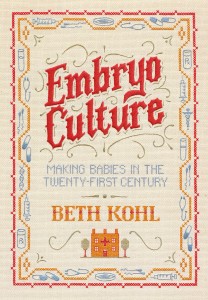 By Jae-Ha Kim
By Jae-Ha Kim
Chicago Sun-Times
September 2, 2007
When Beth Kohl was working on her M.F.A. at the School of the Art Institute of Chicago, she didn’t want to be known as “that IVF” woman. By then, she had already gained a reputation for writing eloquent class assignments about her reproductive journey — which would become the seed for her debut as an author. But she didn’t want to be pigeonholed.
“It’s not like I was paranoid about how I would be defined, but I didn’t want my classmates — particularly all the young men in my group — to think that I was going to be talking about my uterus nonstop,” Kohl says, laughing. “At one point, I was this hugely pregnant woman bringing an enormous falafel to class every day. It was kind of hard not to stand out.”
The Winnetka resident is the author of Embryo Culture: Making Babies in the Twenty-First Century. In the intimate and witty book, Kohl is open about the challenges of becoming a parent — something she assumed would happen quickly and naturally when she decided it was time to start a family.
“Truth be told, I would’ve been happy to have gotten pregnant on our honeymoon,” says Kohl, 39. “But we didn’t start until about a year into our marriage. We both had a lot going on. I was working at an ad agency at the time putting in a lot of long hours and traveling a lot for my job.
“When you’re young, you hear all about how you need to be on birth control and how easy it is to get pregnant. But when you’re having fertility issues and you’re desperately trying to have a baby, you realize just how amazing it is for the sperm to actually reach the egg. It’s a wonder anyone manages to get pregnant at all.”
After trying unsuccessfully for a year to conceive, Kohl was diagnosed as clinically infertile. At age 29, she and her husband, Gary (then 32), decided to use assisted reproductive technology to get pregnant. Kohl’s book jacket, which features a photo of her with their three young daughters (including a set of twins), reveals that they ultimately were successful.
Like her book, which is candid, funny and warm, Kohl has a great sense of humor, even as she’s describing a doctor diagnosing her infertility as a symptom of a brain tumor. (Nevermind that she never had a brain tumor.)
Kohl grew up in Wisconsin and came to Chicago to attend graduate school at Northwestern University, where she earned her master of arts in English literature. Though she did some writing at the ad agency she worked for, what she really wanted was to concentrate on creative writing.
“I was very fortunate because my husband encouraged me to quit my job, work on my M.F.A. and write,” Kohl says. “The timing worked out really well. I was in school and had more flexibility to go in for IVF [in vitro fertilization] treatments. I found that in writing classes, I was always writing about what I was going through no matter what the assignment was. I started compiling all those stories, which weren’t in any way linear. I spent six months writing about embryos. One of my stories was about embryos that met in a petri dish. It was fun and dramatic. I loved it.”
Unlike Sylvia Hewlett’s 2002 tome Creating a Life: Professional Women and the Quest for Children, which chastised women for waiting too long to start a family, Kohl’s book is easygoing and nonjudgmental. She lays down the facts, but makes it clear that having a family isn’t the be-all, end-all. She also is adamant that not being able to have a baby doesn’t make the woman (or her partner) a failure.
“Women are so hard on themselves,” she says. “We blame ourselves if things don’t go along as planned.”
But sometimes, doctors unintentionally blame the woman for waiting too long as well.
“I had a doctor who basically said it was my fault I couldn’t get pregnant,” Kohl says. “In reality, I had polycystic ovarian disorder [a leading cause of infertility], which isn’t something I could have prevented. But that was one of the things I had to go through to get to where I am now.”
Pausing, she adds with a laugh, “It does make for a good story, though.”





